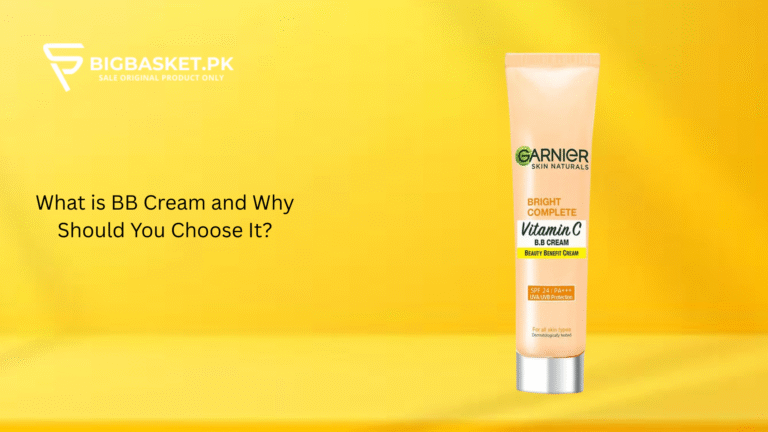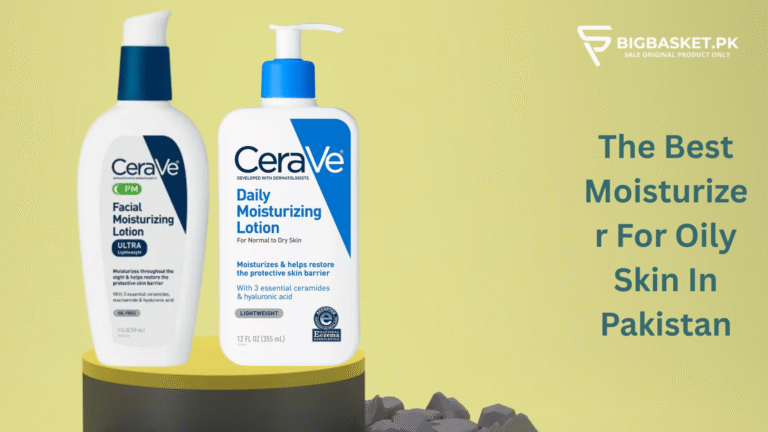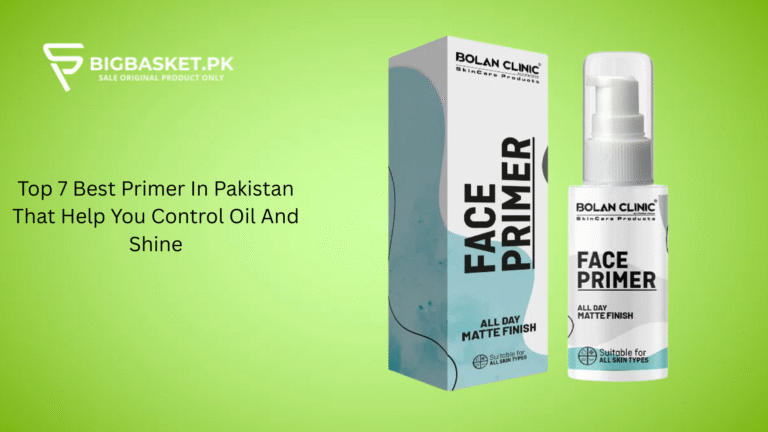Six Best Cream For Acne In Pakistan – BigBasket.Pk
Contents
- 1 Understanding Acne: Causes and Types
- 2 The Importance of Choosing the Right Acne Treatment
- 3 Best Acne Treatment Creams for Oily Skin
- 4 Best Acne Treatment Creams for Sensitive Skin
- 5 Can Acne Creams Help with Acne Scars?
- 6 How to Choose the Right Acne Cream for Your Skin Type
- 7 Acne Treatment Creams and Their Side Effects
- 8 Acne Treatment Routine: Steps for Clearer Skin
Understanding Acne: Causes and Types
What Causes Acne?
Acne develops when the skin’s pores become clogged with excess oil, dead skin cells, and sometimes bacteria. This clogging results in pimples, blackheads, or cysts. The overproduction of oil, especially in areas like the face, back, and chest, can increase the likelihood of acne. Factors such as hormonal changes, stress, certain medications, and diet also play significant roles in acne development. Understanding the cause of acne helps in choosing the right treatment for effective results.
Types of Acne: Pimples, Blackheads, and Cysts
Acne manifests in various forms, from minor blackheads to painful cysts. Pimples are small, raised bumps that are typically filled with pus. Blackheads occur when pores become clogged with oil and dead skin cells, causing the top of the pores to darken. Cysts, on the other hand, are deep, painful acne lesions that often require professional treatment. Recognizing the type of acne can help you select the most appropriate acne cream to target the specific type of breakouts you have.
How Hormones Affect Acne
Hormonal fluctuations are one of the leading causes of acne, particularly during puberty, menstruation, pregnancy, or even while starting or stopping birth control. These changes can trigger the sebaceous glands to produce more oil, which can clog pores and lead to acne. Hormones, especially androgens, stimulate these glands, making acne more common in adolescents and adults, particularly those with oily skin. Proper treatment options can help balance oil production and control acne caused by hormonal changes.
The Importance of Choosing the Right Acne Treatment
Understanding Your Skin Type
Before choosing an acne treatment, it’s essential to understand your skin type. People with oily skin tend to have excess oil production, which can lead to clogged pores and acne. Dry skin, on the other hand, may require more hydrating products to avoid exacerbating the dryness. Combination skin may need a treatment that works on both oily and dry areas. Identifying your skin type allows you to select acne treatment products that work best for your specific needs, ensuring better results.
Targeted Ingredients for Acne Treatment
When looking for an acne treatment cream, it’s essential to choose products with proven ingredients like benzoyl peroxide, salicylic acid, and retinoids. Benzoyl peroxide kills acne-causing bacteria and reduces inflammation, making it effective for treating pimples. Salicylic acid helps to exfoliate the skin and unclog pores. Retinoids boost cell turnover and prevent pores from becoming clogged. These ingredients are key to addressing the root causes of acne and ensuring clearer skin.
Avoiding Common Acne Mistakes
Many people make the mistake of over-applying acne treatments, hoping for quicker results. However, overuse of acne creams can lead to dryness, irritation, and even more breakouts. Another mistake is choosing products that are too harsh for sensitive skin, which can cause inflammation. It’s also essential not to pick at acne, as this can spread bacteria and worsen the condition. Using a gentle, consistent skincare routine with the right products is the best approach to treating acne.
Best Acne Treatment Creams for Oily Skin
Salicylic Acid-Based Creams for Oily Skin
For oily skin, salicylic acid is one of the best ingredients to treat acne. It works by exfoliating the skin and removing dead skin cells that can clog pores, leading to breakouts. Salicylic acid also penetrates deep into the pores to reduce the inflammation that causes acne. Acne creams with salicylic acid are often lightweight, oil-free, and formulated to balance oil production while targeting acne.
Benzoyl Peroxide Acne Treatments
Benzoyl peroxide is an effective treatment for acne, especially for those with oily skin. It helps reduce the bacteria on the skin that contribute to acne while also drying out excess oil. Benzoyl peroxide-based creams often have a more drying effect, which is ideal for oily skin but can be too harsh for dry or sensitive skin. Using these creams in moderation can significantly help in controlling acne while maintaining healthy, balanced skin.
Oil-Free Moisturizers for Acne-Prone Skin
Even oily skin requires moisturization. Using an oil-free moisturizer after acne treatment helps prevent dryness and irritation. These moisturizers help hydrate the skin without contributing to excess oil production. Look for moisturizers that contain hyaluronic acid or glycerin, which draw moisture into the skin without clogging pores. This helps keep your skin hydrated while preventing the development of new acne.
Best Acne Treatment Creams for Sensitive Skin
Gentle Acne Creams for Sensitive Skin
Sensitive skin requires extra care when treating acne. Look for acne creams that are formulated for sensitive skin, avoiding harsh chemicals and fragrances that can lead to irritation. Aloe vera, chamomile, and niacinamide are excellent ingredients in acne creams for sensitive skin as they have anti-inflammatory and soothing properties, reducing redness and discomfort while fighting acne.
Soothing Ingredients for Sensitive Skin
For sensitive skin, it’s crucial to choose acne treatment creams that contain soothing ingredients. Niacinamide is known for its ability to reduce inflammation and redness without irritating the skin. Aloe vera can help hydrate and soothe the skin, while green tea extract provides antioxidant protection and helps calm irritated skin. These ingredients help calm the skin while treating acne, making them perfect for sensitive skin.
Fragrance-Free Acne Treatments
Fragrance-free products are essential for individuals with sensitive skin since fragrances can cause skin irritation and allergic reactions. Acne creams that are fragrance-free or hypoallergenic are often gentler and better tolerated by sensitive skin. They offer acne treatment without causing additional irritation or discomfort, ensuring that the skin remains calm and clear.
Can Acne Creams Help with Acne Scars?
Creams with Retinoids for Scar Healing
Retinoids, like retinol, are not only great for treating active acne but also play a crucial role in fading acne scars. They work by increasing skin cell turnover, encouraging the production of fresh, new skin. This process can help to lighten hyperpigmentation and improve the overall texture of the skin, making them a great option for acne scars.
Vitamin C for Brightening and Fading Scars
Vitamin C is another powerful ingredient for treating acne scars. Known for its brightening properties, Vitamin C helps reduce the appearance of dark spots caused by acne. It works by inhibiting melanin production, which is responsible for hyperpigmentation. Regular use of Vitamin C-based creams can significantly lighten acne scars and give your skin a more even tone.
Topical Treatments for Hyperpigmentation
In addition to Vitamin C, treatments containing alpha-hydroxy acids (AHAs) and beta-hydroxy acids (BHAs) can be helpful for fading acne scars. These exfoliating acids gently remove the top layer of dead skin, revealing fresher skin underneath. Over time, this can help reduce the appearance of dark spots and improve the texture of acne scars, giving your skin a smoother, more even appearance.
How to Choose the Right Acne Cream for Your Skin Type
For Oily Skin: Choosing Non-Comedogenic Products
If you have oily skin, it’s essential to choose non-comedogenic products, meaning they won’t clog your pores. Acne creams for oily skin should focus on controlling oil production without drying out the skin excessively. Look for products that contain ingredients like salicylic acid, which help reduce excess oil while preventing breakouts.
For Dry Skin: Hydrating Acne Treatments
Dry skin needs extra moisture, even when treating acne. Choose hydrating acne treatments that balance acne control with skin nourishment. Hyaluronic acid, glycerin, and ceramides are great ingredients to look for, as they help lock moisture into the skin without clogging pores. These products treat acne while keeping the skin hydrated and smooth.
For Combination Skin: Multi-Action Products
Combination skin requires acne treatments that can work on both oily and dry areas of the face. Multi-action acne creams contain ingredients that can balance oil production while moisturizing dry areas. Products that combine salicylic acid for acne treatment with hydrating ingredients like glycerin can effectively treat breakouts without drying out the skin.
Acne Treatment Creams and Their Side Effects
Common Side Effects of Acne Creams
While acne creams can be highly effective, they may come with some side effects. The most common side effects include dryness, redness, and peeling of the skin. These effects are usually temporary and can be minimized by using the cream sparingly and gradually increasing its use. If side effects persist, it’s important to consult with a dermatologist to adjust the treatment.
How to Minimize Skin Irritation
To minimize irritation from acne creams, start by using the product once a day or every other day. Apply a thin layer to the affected areas and use a moisturizer to prevent dryness. If your skin becomes irritated, consider switching to a gentler formula or taking a break from the product to let your skin recover.
When to Stop Using Acne Treatment Creams
If you experience severe redness, swelling, or an allergic reaction, stop using the product immediately. If irritation continues after discontinuing use, consult with a dermatologist for advice. In some cases, a different treatment plan may be required to address your acne without causing further damage to your skin.
Acne Treatment Routine: Steps for Clearer Skin
Cleansing: The First Step in Acne Treatment
A proper acne treatment routine starts with a gentle cleanser to remove dirt, oil, and makeup from your skin. Cleansing helps prepare your skin to absorb the treatment cream effectively. Look for a non-comedogenic cleanser that won’t clog pores, and use lukewarm water to avoid irritating your skin.
Applying Acne Treatment Creams
Once your skin is clean, apply a thin layer of your chosen acne treatment cream to the affected areas. Be sure to follow the instructions on the product and avoid over-applying. Some creams may require a thin layer applied once or twice daily, depending on your skin’s tolerance.
Moisturizing After Acne Treatment
After applying acne treatment, follow up with a non-comedogenic moisturizer to keep your skin hydrated. Hydration is key, especially if the treatment causes any dryness or irritation. A good moisturizer will soothe the skin and prevent it from feeling tight or uncomfortable while helping to lock in moisture.









